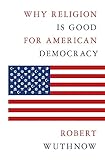Why Religion Is Good for American Democracy / Robert Wuthnow.
Material type: TextPublisher: Princeton, NJ : Princeton University Press, [2021]Copyright date: ©2021Description: 1 online resource (328 p.)Content type:
TextPublisher: Princeton, NJ : Princeton University Press, [2021]Copyright date: ©2021Description: 1 online resource (328 p.)Content type: - 9780691222646
- Democracy -- United States -- Religious aspects
- Political culture -- United States
- Political participation -- United States -- Religious aspects
- Religion and politics -- United States
- Religious pluralism -- Political aspects -- United States
- SOCIAL SCIENCE / Sociology of Religion
- Activism
- Advocacy group
- Advocacy
- African Americans
- American Jewish Congress
- Americans
- Authoritarianism
- Baptist World Alliance
- Baptists
- Big government
- Billy Graham
- Black church
- Catholic Church
- Chaplain
- Christian denomination
- Christian
- Christianity Today
- Christianity
- Church World Service
- Civil society
- Clergy
- Communism
- Community organization
- Congregational church
- Conscientious objector
- Consideration
- Criticism
- Deliberation
- Democracy
- Disputation
- Doctrine
- Economic inequality
- Employment
- Freedom of assembly
- Freedom of religion
- Freedom of speech
- Funding
- Government
- Grassroots
- Immigration
- Impediment (canon law)
- Institutional racism
- Interfaith Center on Corporate Responsibility
- Interfaith dialogue
- Jehovah's Witnesses
- Jews
- John Haynes Holmes
- Judeo-Christian
- Lecture
- Legislation
- Legislator
- Living wage
- Lutheranism
- Mennonite
- Methodism
- Moral responsibility
- National Association for the Advancement of Colored People
- National Council of Churches
- Pacifism
- Parochial school
- Pastor
- Pentecostalism
- Place of worship
- Politics
- Presbyterianism
- Prosperity theology
- Protestantism
- Public policy
- Puritans
- Racial segregation
- Racism
- Reform Judaism
- Reinhold Niebuhr
- Religion in the United States
- Religion
- Religious community
- Religious organization
- Separation of church and state
- Small government
- Social Gospel
- Social issue
- Social justice
- Southern Baptist Convention
- State religion
- Supreme Being
- Tax
- The Other Hand
- Theology
- Totalitarianism
- Trade union
- Unemployment
- United Church of Christ
- United States Constitution
- Vaccination
- Voluntary association
- Voting
- Wealth
- Welfare
- World War I
- World War II
- 322/.10973 23
- online - DeGruyter
| Item type | Current library | Call number | URL | Status | Notes | Barcode | |
|---|---|---|---|---|---|---|---|
 eBook
eBook
|
Biblioteca "Angelicum" Pont. Univ. S.Tommaso d'Aquino Nuvola online | online - DeGruyter (Browse shelf(Opens below)) | Online access | Not for loan (Accesso limitato) | Accesso per gli utenti autorizzati / Access for authorized users | (dgr)9780691222646 |
Frontmatter -- Contents -- Introduction -- 1 Against Tyranny: -- 2 Liberty of Conscience: -- 3 Freedom of Assembly: -- 4 Human Dignity: -- 5 Inclusion: -- 6 The Wealth Gap: -- 7 Health and Wellness: -- Conclusion -- Notes -- Index
restricted access online access with authorization star
http://purl.org/coar/access_right/c_16ec
How the actions and advocacy of diverse religious communities in the United States have supported democracy’s development during the past centuryDoes religion benefit democracy? Robert Wuthnow says yes. In Why Religion Is Good for American Democracy, Wuthnow makes his case by moving beyond the focus on unifying values or narratives about culture wars and elections. Rather, he demonstrates that the beneficial contributions of religion are best understood through the lens of religious diversity. The religious composition of the United States comprises many groups, organizations, and individuals that vigorously, and sometimes aggressively, contend for what they believe to be good and true. Unwelcome as this contention can be, it is rarely extremist, violent, or autocratic. Instead, it brings alternative and innovative perspectives to the table, forcing debates about what it means to be a democracy.Wuthnow shows how American religious diversity works by closely investigating religious advocacy spanning the past century: during the Great Depression, World War II, the civil rights movement, the debates about welfare reform, the recent struggles for immigrant rights and economic equality, and responses to the coronavirus pandemic. The engagement of religious groups in advocacy and counteradvocacy has sharpened arguments about authoritarianism, liberty of conscience, freedom of assembly, human dignity, citizens’ rights, equality, and public health. Wuthnow hones in on key principles of democratic governance and provides a hopeful yet realistic appraisal of what religion can and cannot achieve.At a time when many observers believe American democracy to be in dire need of revitalization, Why Religion Is Good for American Democracy illustrates how religious groups have contributed to this end and how they might continue to do so despite the many challenges faced by the nation.
Mode of access: Internet via World Wide Web.
In English.
Description based on online resource; title from PDF title page (publisher's Web site, viewed 01. Dez 2022)


